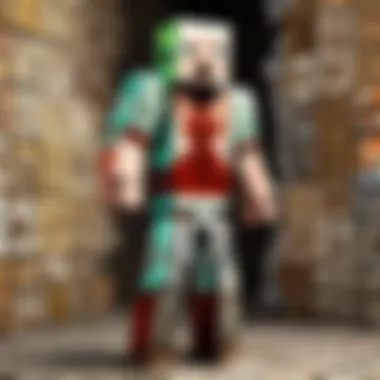Mastering the Art of Editing Wikipedia Pages: A Comprehensive Guide


How to Edit Wikipedia Pages
Wikipedia, as the largest online encyclopedia globally, offers a vast platform for knowledge sharing and dissemination. Understanding how to effectively edit Wikipedia pages is crucial for contributing valuable information to this dynamic platform. From comprehending Wikipedia's editing guidelines to successfully navigating the editing interface, mastering the art of editing can empower individuals to make meaningful contributions to this ever-evolving repository of knowledge.
Wikipedia Editing Policies Demystified
Before embarking on your editing journey, it's essential to grasp the intricacies of Wikipedia's editing policies. Familiarize yourself with the guidelines that govern content creation, revision, and deletion on Wikipedia. Upholding these policies ensures the credibility and reliability of content shared on the platform. By adhering to Wikipedia's standards, editors play a vital role in maintaining the integrity of information presented on this widely accessed site.
Navigating the Editing Interface
Once you've acquired a firm understanding of Wikipedia's editing policies, navigating the editing interface is the next step towards successfully changing Wikipedia pages. Explore the various tools and features available within the editing interface to enhance your editing experience. From formatting text to adding citations, mastering the editing interface empowers editors to effectively communicate ideas and information in a clear and concise manner.
Best Practices for Contributing to Wikipedia
As you delve into the realm of Wikipedia editing, embracing best practices can elevate the quality of your contributions. Learn how to create well-researched and verifiable content that enriches existing Wikipedia pages. Engage with the Wikipedia community to gather feedback and refine your editing skills continuously. By following these best practices, you can play a pivotal role in shaping the information presented on Wikipedia and contributing meaningfully to the collective repository of knowledge.
Latest Updates and Patch Notes
Ensuring that you remain updated with the latest developments and changes within the Wikipedia platform is essential for staying informed about new features and updates. Discover the intricacies of patch notes and explore how new features impact the functionality and user experience of Wikipedia. Gain insights into biome and world generation updates to understand how these changes influence the scope and diversity of content available on Wikipedia.
Community Engagement and Speculations
Engage with the Wikipedia community to delve into the realm of speculation and theories surrounding upcoming updates and features. Exchange ideas and insights with fellow editors to gain a comprehensive understanding of the potential modifications and additions to Wikipedia. By actively participating in community discussions and speculations, you can stay abreast of the latest trends and developments within the Wikipedia ecosystem.
Enhancing User Experience with Mods
Exploring the realm of modifications (mods) can significantly enhance your user experience on the Wikipedia platform. Delve into the top mods of the month to discover new functionalities and features that augment your editing capabilities. Explore mod installation guides to seamlessly integrate mods into your editing workflow, unlocking a world of possibilities and customization options within Wikipedia.
Mod Showcase and Spotlight
Embark on a journey through the world of mod showcases and spotlights to uncover hidden gems and innovative add-ons that transform your Wikipedia editing experience. Gain insights into the creative potential of mods and learn how these modifications can streamline your editing process while introducing new dimensions of creativity and versatility.
The Future of Wikipedia: Trends and Developments
Peering into the future of Wikipedia unveils a landscape of exciting trends and developments that are poised to reshape the platform. Explore industry news and trends to stay ahead of the curve and anticipate upcoming features and sneak peeks. Delve into the behind-the-scenes of updates to gain a deeper understanding of the efforts and innovations driving Wikipedia's evolution into a cutting-edge information hub.


Introduction
In the vast realm of digital knowledge, Wikipedia stands as a beacon of information, continually shaped and refined by a global community of contributors. The introduction section of this guide sets the stage for a journey into the intricate art of editing Wikipedia pages. Understanding the nuances of Wikipedia's editing policies is crucial for anyone aiming to make meaningful contributions to this ever-evolving online encyclopedia.
Understanding Wikipedia's Editing Policies
Reviewing Wikipedia's guidelines
Diving into the depths of Wikipedia's guidelines unveils a holistic view of the platform's principles and standards. Reviewing these guidelines is akin to deciphering the DNA of Wikipedia itself, grasping the core elements that govern content creation and modification. The meticulous nature of reviewing guidelines ensures a cohesive and reliable database, fostering a community committed to accuracy and credibility. By adhering to these guidelines, editors lay a sturdy foundation for the edifice of information that is Wikipedia.
Getting familiar with the rules of engagement
Crafting a solid understanding of the rules of engagement within the Wikipedia ecosystem is akin to learning the etiquette of a new culture. Navigating these rules lays the groundwork for respectful and effective collaboration within the community. By familiarizing themselves with these rules, editors harness the power of constructive discourse, steering clear of potential pitfalls that could hinder their contribution journey. Embracing these rules signifies a commitment to upholding the integrity of Wikipedia's collective knowledge.
Creating a Wikipedia Account
Signing up for a Wikipedia account
The initial step towards embarking on a Wikipedia editing voyage involves signing up for a personal account. This pivotal act not only grants access to the editing interface but also signifies a commitment to becoming a valuable member of the Wikipedia community. Through this account, editors step into a realm where their contributions hold weight, shaping the narrative of countless articles. Creating a Wikipedia account marks the initiation of a journey towards enriching the digital repository of human knowledge.
Verifying your account via email
Verifying the created account via email serves as a crucial security measure, safeguarding the integrity of the editing process. This verification step cements the authenticity of the editor's identity, instilling trust within the Wikipedia community. By verifying their account, editors establish a secure pathway for engaging with the vast expanse of Wikipedia content, ensuring their mark on the platform is both meaningful and lasting.
Exploring the Editing Interface
Accessing the editing tools
As editors embark on the editing journey, mastering the art of accessing the editing tools is akin to wielding a craftsman's instruments. These tools serve as the bridge between an editor's imagination and the tangible modifications made to Wikipedia articles. By familiarizing themselves with these tools, editors unlock a realm of creative potential, allowing them to craft and refine content with precision and finesse.
Understanding the layout of the editing page
Delving into the intricacies of the editing page's layout unveils a blueprint of digital construction, guiding editors through the maze of content modification. Understanding this layout is akin to deciphering a map, enabling editors to navigate seamlessly through the vast landscape of Wikipedia articles. By grasping the layout's nuances, editors gain mastery over the canvas on which they paint their contributions, ensuring that each edit harmonizes with the broader tapestry of Wikipedia's knowledge base.
Making Edits to Wikipedia Pages
Making edits to Wikipedia pages is a fundamental aspect of effectively contributing to the world's largest online encyclopedia. By adding new content, editing existing information, and incorporating media such as images, editors play a vital role in ensuring the accuracy and quality of Wikipedia articles. Understanding the nuances of making edits is essential to uphold the platform's credibility and provide valuable information to users worldwide.


Adding Content
When it comes to adding content on Wikipedia, inserting text is a key element that enriches articles with relevant information. The process of inserting text involves carefully crafting and integrating new textual details into existing entries, enhancing their depth and relevance. This practice significantly contributes to the overall quality of Wikipedia articles, making them more informative and engaging for readers. However, it is crucial to ensure that the inserted text aligns with Wikipedia's guidelines and standards to maintain accuracy and reliability.
Incorporating citations is another critical aspect of adding content on Wikipedia. By including proper references and citations within articles, editors support the veracity and credibility of the information presented. Citations not only validate the content but also enable readers to further explore the sources and delve deeper into the topic. This practice strengthens the integrity of Wikipedia articles and reinforces the platform's reputation as a reliable source of information.
Editing Existing Content
Correcting factual errors plays a crucial role in maintaining the accuracy and credibility of Wikipedia articles. Identifying and rectifying inaccuracies ensures that readers receive reliable information, contributing to the platform's overall credibility. By addressing factual errors promptly, editors uphold Wikipedia's reputation as a trusted source of knowledge, fostering trust and confidence among users.
Improving article readability is essential for enhancing the user experience and ensuring that information is easily accessible and understandable. By optimizing the structure, formatting, and presentation of articles, editors can enhance the clarity and coherence of content, making it more reader-friendly. Improving readability not only engages users more effectively but also reflects the editorial quality and professionalism of Wikipedia.
Uploading Images
Understanding image licensing is a critical aspect of uploading images to Wikipedia articles. Editors must comply with copyright laws and licensing agreements when incorporating images to avoid infringement issues and maintain legal standards within the platform. Properly understanding image licensing ensures that the images used are permissible and align with Wikimedia Commons' guidelines, safeguarding the integrity of Wikipedia articles.
Adding images to Wikipedia articles enhances visual storytelling and enriches the overall content by providing context and visual representation. Including relevant images can significantly improve the user experience, captivate readers' attention, and effectively convey information. By strategically integrating images, editors can make articles more engaging and informative, appealing to a wider audience while upholding the platform's quality standards.
Engaging with the Wikipedia Community
Engaging with the Wikipedia Community is a crucial aspect when it comes to editing and contributing to Wikipedia pages. By interacting with other editors, users can enhance collaboration, share knowledge, and ensure the quality of content remains high. Building relationships within the community fosters a sense of belonging and responsibility towards maintaining the credibility of information on Wikipedia. It also opens doors to valuable feedback and constructive discussions that can further enrich one's editing experience.
Communicating on Talk Pages
Initiating discussions
Initiating discussions plays a pivotal role in fostering transparent communication and generating diverse perspectives on various topics. By starting conversations on talk pages, editors can draw attention to specific issues, propose changes, and seek input from the community. This proactive approach stimulates engagement and cultivates a spirit of inclusivity, encouraging collaborative problem-solving and idea exchange. Initiating discussions is a cornerstone of effective teamwork on Wikipedia, allowing contributors to voice their thoughts and contribute meaningfully to content development.
Resolving editing conflicts
Resolving editing conflicts is essential for maintaining harmonious interactions within the Wikipedia community. Conflicts can arise due to differences in opinions, editing styles, or content interpretations. By addressing conflicts in a respectful and constructive manner, editors can find common ground, reconcile differences, and reach consensus effectively. This practice promotes a positive editing environment, upholds professional conduct, and ensures that editorial disputes are settled amicably, safeguarding the integrity of Wikipedia's collaborative editing process.
Participating in WikiProjects
Participating in WikiProjects offers editors the opportunity to engage with like-minded individuals who share common interests and goals. By joining relevant projects, editors can specialize in specific topic areas, collaborate on focused tasks, and contribute expertise to collective initiatives. This targeted approach enhances productivity, encourages knowledge-sharing, and strengthens the overall quality of content within dedicated project scopes. WikiProjects serve as hubs for collaboration, providing a platform for editors to connect, coordinate efforts, and make significant contributions to Wikipedia's vast repository of information.
Collaborating with other editors


Collaborating with other editors cultivates a culture of teamwork, mutual learning, and shared success within the Wikipedia community. By working together on articles, discussing edits, and providing constructive feedback, editors can pool their skills, resources, and insights to produce well-rounded content. Collaboration promotes diversity of thought, encourages peer review, and drives continuous improvement in editing practices. Leveraging the collective expertise of multiple editors elevates the quality and accuracy of Wikipedia pages, creating a more comprehensive and reliable knowledge base for all users.
Understanding Wikipedia Etiquette
Maintaining respectful communication and upholding ethical standards are fundamental principles of Wikipedia etiquette. By respecting other editors' contributions, acknowledging varying viewpoints, and engaging in civil discourse, editors can foster a positive and inclusive editing environment. Respecting other editors' work cultivates a sense of camaraderie, builds trust, and encourages reciprocal respect among community members. Similarly, avoiding edit wars by resolving disagreements through dialogue, consensus-building, and adherence to Wikipedia's content guidelines ensures a constructive editing atmosphere where divergent opinions can coexist harmoniously. Embracing Wikipedia etiquette practices not only promotes professionalism but also enriches the collaborative editing experience for all participants.
Reviewing Edits and Monitoring Contributions
As we delve into the intricacies of editing Wikipedia, the aspect of reviewing edits and monitoring contributions stands out prominently. This section plays a vital role in ensuring the accuracy and credibility of information on Wikipedia pages. By reviewing edits, editors can verify the validity of changes made to articles, safeguarding against misinformation and biased content. Monitoring contributions allows editors to track the evolution of a page, identify areas for improvement, and detect potential vandalism or spam. These processes are essential for maintaining the integrity of Wikipedia as a reliable source of information.
Checking Edit History
Viewing previous revisions
Viewing previous revisions is a key feature that empowers editors to track the progression of an article over time. This function enables users to compare different versions of a page, pinpoint specific changes made by editors, and revert to earlier iterations if necessary. By exploring the edit history, editors can gain insights into the collaborative nature of Wikipedia editing, understand how articles evolve, and ensure the accuracy and comprehensiveness of content. Viewing previous revisions is a fundamental tool for maintaining the quality and reliability of Wikipedia articles, promoting transparency and accountability within the editing community.
Tracking changes made by others
Tracking changes made by others provides editors with a means to stay informed about modifications to articles that they are interested in or responsible for. This feature enhances collaboration and knowledge sharing among editors, as it allows individuals to follow the evolution of specific pages and stay updated on relevant edits. By tracking changes, editors can engage in discussions regarding modifications, address discrepancies, and contribute to the ongoing improvement of Wikipedia content. This function fosters a sense of community and accountability, encouraging editors to work together towards the common goal of creating accurate and informative articles.
Watching Pages
Adding pages to your watchlist
Adding pages to your watchlist enables editors to keep a close eye on specific articles that are of personal interest or relevance. By adding pages to their watchlist, editors receive notifications about changes made to those pages, staying informed about edits, discussions, and developments in real-time. This feature facilitates active participation in editing activities, allowing users to engage with the content that matters most to them. Adding pages to your watchlist is a proactive way to stay connected to the Wikipedia community, contribute effectively, and remain up-to-date on topics of importance.
Receiving notifications on page edits
Receiving notifications on page edits ensures that editors are promptly alerted to any changes made to articles on their watchlist. This function provides real-time updates on edits, discussions, and other activities related to the watched pages, keeping editors informed and engaged in the editing process. By receiving notifications, editors can respond quickly to new developments, provide input where needed, and maintain the quality of Wikipedia content. This feature enhances communication, collaboration, and vigilance within the editing community, empowering editors to take active roles in shaping the evolution of Wikipedia pages.
Conclusion
In the intricate process of changing Wikipedia content lies the indispensable significance of the conclusion - a pivotal segment encapsulating the essence of successful editing. This juncture serves as the culmination of meticulous efforts, embodying the summation of mastering the editing policies, harnessing the editing tools, engaging with the community, and monitoring contributions. The conclusion definitively cements the reader's knowledge, emphasizing the paramount importance of consistency, accuracy, and adherence to Wikipedia's guidelines. By acknowledging the finality of the editing journey, contributors instill a sense of pride and accomplishment in their editorial contributions.
Final Tips for Successful Wikipedia Editing
Staying updated on Wikipedia policies
Staying abreast of the dynamic landscape of Wikipedia policies stands as a cornerstone of successful Wikipedia editing endeavors. The consistent evolution of guidelines and regulations necessitates a vigilant approach towards understanding and adhering to the latest dictates. Delving into the intricacies of policy updates not only bolsters editorial proficiency but also safeguards against inadvertent violations. By cultivating a habit of regular policy scrutiny, editors fortify their editing repertoire, thereby enhancing the credibility and relevance of their contributions within the digital realm.
Continuously improving your editing skills
A pivotal facet in the realm of Wikipedia editing revolves around the perpetual quest for enhancing one's editing acumen. Embracing a growth mindset that emphasizes adaptability, receptiveness to feedback, and a penchant for refinement positions editors on a trajectory towards excellence. The iterative process of honing editing skills fosters a culture of continuous learning and improvement, propelling editors towards editorial mastery. Equipped with a fervor for refinement, contributors navigate the ever-changing landscape of Wikipedia with acuity, precision, and dexterity.



